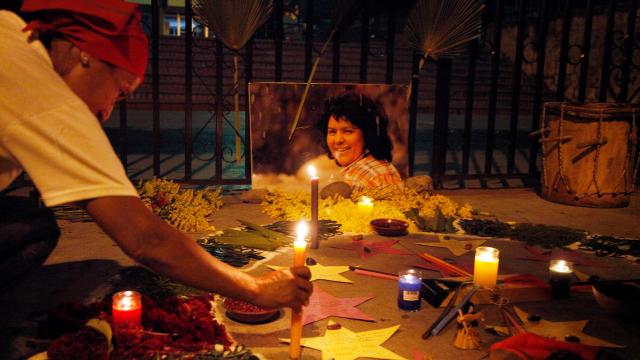Environmental destruction like deforestation, mining, and climate change aren’t just bad for ecosystems. They pose serious risks to women around the world, and a new report shows just how pervasive and even deadly those risks are. I’m talking about some of the most egregious forms of violence there are: sexual assault, human trafficking, and death.
The International Union for Conservation of Nature (typically known for new report on Wednesday chronicling how environmental degradation disproportionately hurts women using more than 80 global case studies, more than 1,000 sources, and feedback from peer reviewers. That makes it one of the most in-depth analyses of the complex linkage between violence against women and environmental degradation. The findings are important policymakers who work on global inequality and sustainability issues, an area that’s only becoming more pressing as the climate crisis intensifies.
“We have always known that gender-based violence is pervasive”¨,” co-author Cate Owren, senior gender program manager at the IUCN Global Program on Governance and Rights, told Earther. “What was shocking was the extent, the pervasiveness of it”¨.”
[referenced url=” thumb=” title=” excerpt=”]
The researchers found women have less access to natural resources and face higher threats of violence when illegal loggers or fisheries come to their communities. At the same time, they found women face more direct impacts from these environmental threats, particularly if they choose or are forced to defend land and resources.
For instance, we know that environmental defenders face high murder rates, especially indigenous peoples. Over the past 15 years, at least 684 individuals have been killed attempting to protect their land. This threat is real for all environmental defenders regardless of gender, but the report details how women are particularly at risk. The authors note that there have been 609 instances of aggression against Central American and Mexican women between 2015 and 2016 alone. Report authors also surveyed experts and found 59 per cent of respondents had observed gender-based violence related to environmental issues, including land rights and energy infrastructure.
The comprehensive 272-page report goes on to note how women’s roles in society can be weaponised against them if they engage in environmental activism and protection. The authors refer to the “double burden” women face as mothers and activists, which has led some communities to label them “as “˜bad mothers’ for leaving their children at home when off working to defend their environment and communities.” In some cases, women environmental defenders have contended with threats that their children will be taken away as a result, which “can have long-lasting effects for young women, their families and communities, as well as environmental defence.”
These impacts don’t affect only the women who speak out, however. All women face environmental risks, especially in the Global South where extreme weather events are taking on new forms due as the planet heats up. There’s the unique risk women face when they are displaced from their home and become refugees. This can expose women, girls, and young children to human trafficking according to the report. In many parts of the world, women handle household duties and must manage food scarcity after extreme weather hits. When crops are wiped out, women are often left to deal with how to feed their children and families. The stress of these types of situations also allows for domestic violence to thrive, especially in cultures where this behaviour is acceptable.
Violence is hardly limited to the developing world. There was an uptick in abuse after Hurricane Michael in 2018 in the U.S. for instance. And for years, indigenous leaders in the U.S., Canada, and elsewhere have been ringing the alarm on the dangers oil and gas projects pose to local women as these projects typically bring in outside men into this tight-knit communities. Sexual violence typically follows the creation of so-called man camps.
“On one hand, violence is about power and control, but on the other, it happens in the absence of power and control”¨,” Nadine Shaanta Murshid, an assistant professor of social work at the University of Buffalo who focuses on intimate partner violence and was not involved in this report, told Earther. “That’s the part that requires more understanding.”
Though this report encompasses a number of environmental issues, they all ultimately tie back to climate change. If deforestation doesn’t stop, climate change can worsen. The extraction of oil and gas is fuelling the climate crisis. The warming of the Earth is disrupting natural cycles communities rely on to grow and search for food.
This report, while in-depth, is only scratching the surface of a topic that sorely needs attention. Climate change is here, and women around the world are already seeing the dangerous ways the sexist patriarchal system of the world is allowing violence to thrive along with the environmental crisis. For too many, the cost has been their life”and that’s something we, as a society, have a choice to end.
